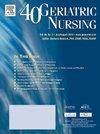老年医学教育和临床知识水平对护士与医生跨专业合作感知的调节作用
IF 2.5
3区 医学
Q3 GERIATRICS & GERONTOLOGY
引用次数: 0
摘要
有效的护士-医生跨专业协作(IPC)可以改善老年医疗保健。虽然已经确定了许多障碍和促进因素,但文献缺乏共识。我们假设护士的教育和知识水平可能会影响他们对IPC的看法。本横断面研究包括117名急症护理医院注册护士。问卷调查了护士的知识水平、对感染的认识、人口统计学和教育特征。数据采用多元回归分析。护士受教育程度改变知识与IPC之间的关系,存在交互作用。在受教育程度较低的护士中,知识的增加与IPC得分较高相关,但在受教育程度最高的护士中,知识的增加与IPC得分较低相关。研究结果表明,护士教育水平、知识和感知IPC之间的关系可能比预期的更复杂。高等教育可能会改变IPC的期望,特别是在等级较高或复杂的患者护理环境中。了解这种关系可能有助于改善IPC,从而改善老年护理。本文章由计算机程序翻译,如有差异,请以英文原文为准。
The moderating effect of educational and clinical geriatric knowledge levels on nurses’ perception of interprofessional collaboration with physicians
Effective nurse-physician interprofessional collaboration (IPC) can improve geriatric healthcare. While many barriers and facilitators have been identified, the literature lacks consensus. We hypothesize that nurses’ educational and knowledge levels may affect their perceptions of IPC.
This cross-sectional study included 117 acute-care hospital Registered Nurses. A questionnaire examined nurses’ knowledge level, perceptions of IPC, demographic and educational characteristics. Data were analyzed using multivariate regression.
An interaction effect was found whereby nurses’ education level modified the relationship between knowledge and IPC. Among less educated nurses increased knowledge was associated with higher IPC, but among the most-educated nurses, higher knowledge was associated with lower IPC scores.
The findings suggest that relationships between nurses’ education level, knowledge, and perceived IPC may be more complex than anticipated. Higher education may alter IPC expectations, particularly in more hierarchal or complex patient care environments. Understanding this relationship may facilitate improvements to IPC leading to improved geriatric care.
求助全文
通过发布文献求助,成功后即可免费获取论文全文。
去求助
来源期刊

Geriatric Nursing
医学-护理
CiteScore
3.80
自引率
7.40%
发文量
257
审稿时长
>12 weeks
期刊介绍:
Geriatric Nursing is a comprehensive source for clinical information and management advice relating to the care of older adults. The journal''s peer-reviewed articles report the latest developments in the management of acute and chronic disorders and provide practical advice on care of older adults across the long term continuum. Geriatric Nursing addresses current issues related to drugs, advance directives, staff development and management, legal issues, client and caregiver education, infection control, and other topics. The journal is written specifically for nurses and nurse practitioners who work with older adults in any care setting.
 求助内容:
求助内容: 应助结果提醒方式:
应助结果提醒方式:


